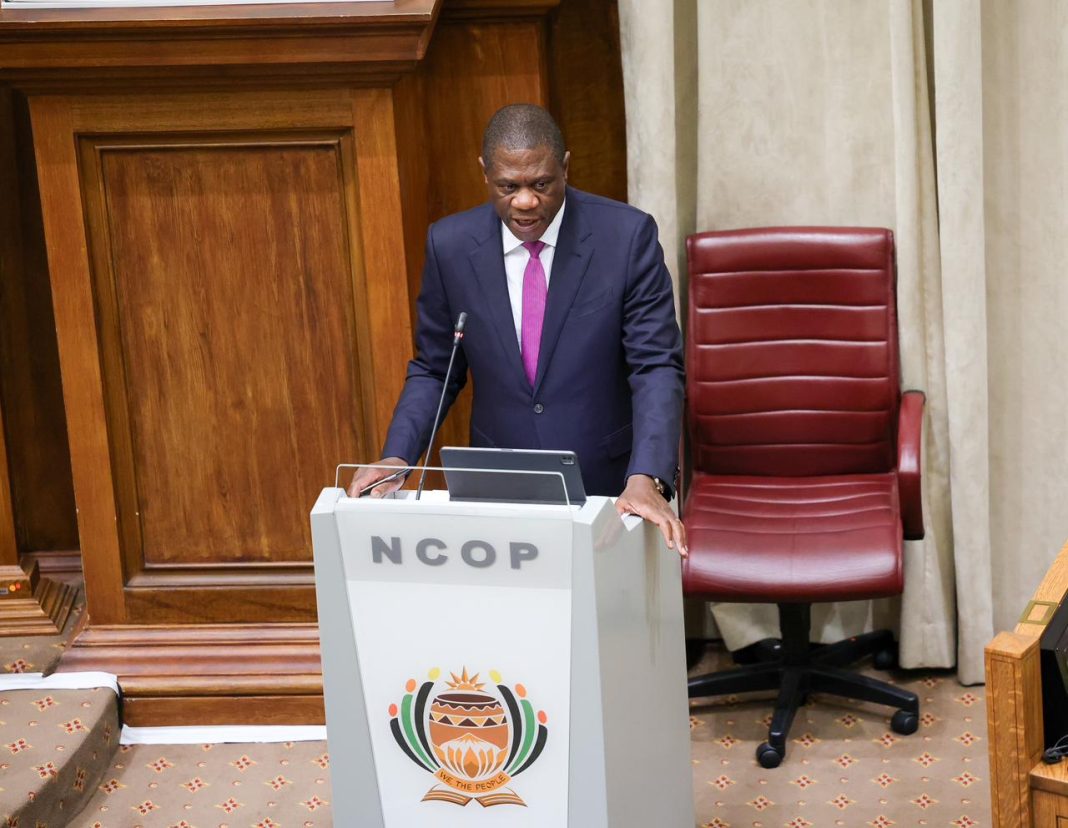By Thapelo Molefe
Deputy President Paul Mashatile on Tuesday defended government’s expanding use of public–private partnerships (PPPs) to stabilise collapsing water and sanitation systems, telling the National Council of Provinces (NCOP) that private capital and technical expertise had become essential as municipalities struggle with governance failures, decaying infrastructure and dwindling delivery capacity.
Mashatile appeared before a hybrid sitting of the NCOP to answer oral questions from delegates, beginning his response by noting that the session coincided with the start of the 16 Days of Activism for No Violence Against Women and Children, which runs from 25 November to 10 December.
Responding to Chief Whip Kenneth Mmoiemang’s question on strengthening PPP investment, Mashatile said the Department of Water and Sanitation (DWS) had recorded a “severe decline” in municipal capacity, with national water reliability sitting at 68% and water quality deteriorating in 60% of supply systems.
“Many of our municipalities are grappling with challenges … including poor governance, lack of technical and administrative capacity, inadequate infrastructure investments, poor maintenance and financial mismanagement,” he said.
Mashatile said government’s water task team was driving a coordinated turnaround focusing on infrastructure upgrades, institutional reform and fast-tracking project management.
The March Water and Sanitation Indaba proposed interventions aimed at arresting the collapse of critical water infrastructure, including increased investment and blended financing models.
A key outcome, he said, was the establishment of the Water Partnerships Office at the Development Bank of Southern Africa (DBSA), created to help municipalities prepare viable projects for private-sector investment.
Through this office, government is already implementing several PPPs, including the flagship Olifants Management Model Programme in Limpopo.
The partnership, designed to meet bulk water needs for local municipalities and industry, is based on a 50-50 financing arrangement, with mining companies contributing half of project costs and government covering the remainder through the Water Infrastructure Grant and the Budget Facility for Infrastructure.
Mashatile added that DWS, water boards and municipalities were expanding collaboration with the Infrastructure Fund to roll out more blended finance water projects over the next three years.
Pressed by Moemang on whether more PPPs were being implemented and how capacity at local and provincial levels was being strengthened, Mashatile pointed to the Government Technical Advisory Centre (GTAC), which houses a dedicated PPP advisory unit.
“They use this as a mechanism to assist municipalities to do proper planning and deal with issues such as water conservation and non-revenue water,” he said.
He listed several municipalities currently implementing PPP-supported initiatives, including the City of Johannesburg, City of Cape Town, Langeberg Local Municipality, and the Vaal Gamagara Water Supply Scheme in the Northern Cape.
Larger national projects include the Lesotho Highlands Water Project and the Umkomaas (Mkomazi) Water Project.
During a sharp exchange, DA delegate Paul Swart demanded to know when the first arrests would be made in cases of water-tanker corruption, accusing government of failing to act against implicated officials.
Mashatile acknowledged widespread abuse of tanker procurement, saying “many people vandalise water infrastructure so that municipalities have no option but to continue to bring water tankers.”
He said National Treasury had issued a circular cautioning municipalities against long-term dependence on tankers, which should be used only as emergency measures.
However, he could not provide specific case outcomes.
“Once we have cases we can cite, we will give you that information,” he said.
EFF delegate Mathapelo Siwisa questioned whether government should abandon PPPs altogether, arguing they “enrich a few while service delivery collapses,” and asked whether compulsory skills-transfer mechanisms and future handovers to the state were being enforced.
Mashatile rejected the suggestion, saying PPPs were necessary to mobilise funding for major water projects that municipalities could not finance alone.
“PPPs are very important … because we bring necessary private-sector funding to deal with the challenge of water,” he said, adding that GTAC and its PPP unit were established precisely to ensure skills and support structures were available.
In another follow-up, Freedom Front Plus delegate Tamarin Breedt questioned the lack of cooperation among water boards, municipalities and the DWS, saying the silo approach was worsening water losses, vandalism and infrastructure collapse.
Mashatile maintained that the Water Partnerships Office was specifically designed to bridge these gaps and ensure that capacity was available where municipalities lacked it.
“We needed capacity to help municipalities prepare projects … PPPs are not very easy. Often you need advisors to deal with the complexities,” he said.
He insisted the 50-50 model was “working” in several regions and that government would continue reviewing mechanisms to improve coordination and accountability.
The NCOP sitting came against the backdrop of deepening water supply failures across the country, escalating infrastructure vandalism and growing public frustration over tanker-related corruption, issues the Deputy President conceded remain far from resolved.
INSIDE METROS

